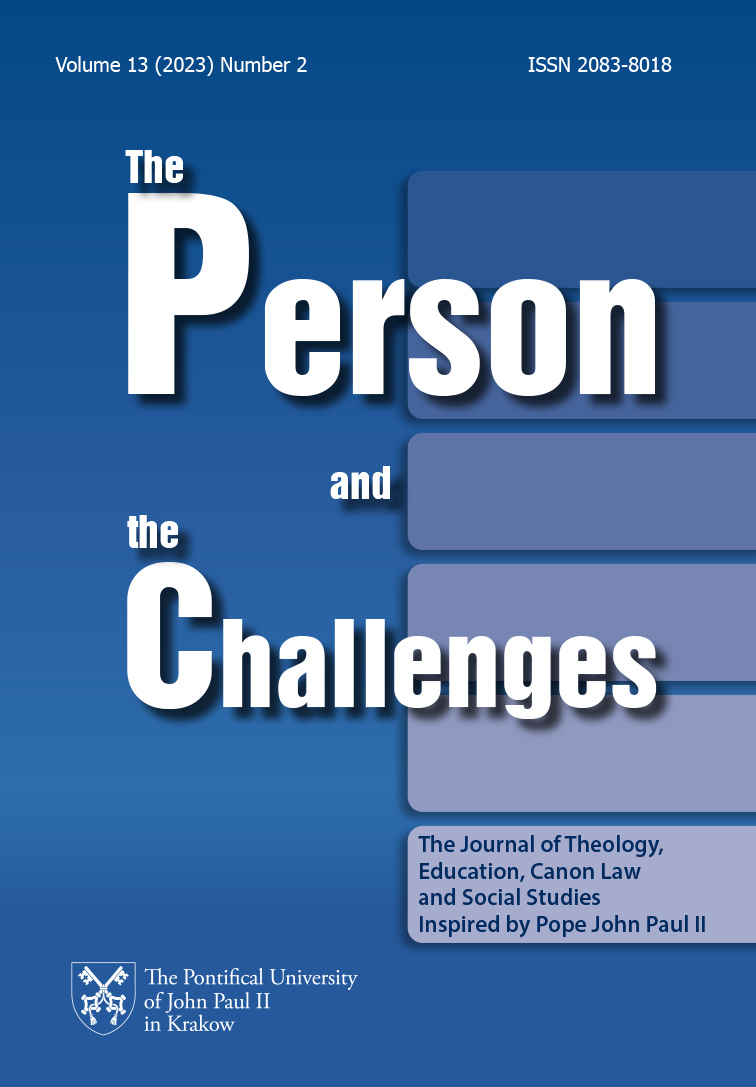Friendship as a Means of Addiction Recovery in the Cenacolo Community: A Case Study on How Work, Prayer, and Friendship Contribute to the Change of Addictive Patterns
DOI:
https://doi.org/10.15633/pch.13214Słowa kluczowe:
practical theology, addiction, friendship, grounded theory, methodologyAbstrakt
Cenacolo community is a Catholic association whose mission is to help people overcome addiction. It originated as a grassroots movement in 1983. by sister Elvira Petrozzi and has over 50 houses worldwide, with headquarters in Italy. Over the years, the community has become known as a place where people change their addictive habits through work and prayer, by living together for an extended period of three years on average. To understand how the method works, we analysed 49 testimonials of former addicts who, at the time of giving testimony, were members of the community. What emerged from the research is that, besides work and prayer, the central motivation for the former addicts to complete the programme, is friendship. This was not clear from the outset, but gradually emerged through the application of the grounded theory. Grounded theory is the methodology developed by sociologists Barney Glaser and Anselm Strauss. It allows the researcher to extract the main features of the studied reality by giving voice to the participants in the first place. Grounded theory has rarely been used in theology, and this research is one of the few done so far in the theological realm. The results show that, while work and prayer have a certain importance, the former addicts find friendship to be the main force which helps them to change their habits and start a new life.
Bibliografia
Adiprasetya J., Revisiting Jürgen Moltmann’s Theology of Open Friendship, “International Journal for the Study of the Christian Church” 21 (2021).
Aldiabat K.M. and C. L. Navenec, Philosophical Roots of Classical Grounded Theory: Its Foundations in Symbolic Interactionism, “The Qualitative Report” 16 (2011).
Allen D. S., Talking to Strangers: Anxieties of Citizenship since Brown v. Board of Education, Chicago 2004, The University of Chicago Press.
Aragno S., A Hope Reborn, Saluzzo 2008, Association San Lorenzo.
Barney S.A. et al. (eds.), The Etymologies of Isidore of Seville, Cambridge 2006, Cambridge University Press.
Birks M. and J. Mills, Grounded Theory: A Practical Guide, London 2011, Sage.
Boehner J., Praying for Change: The Ignatian Examen in the Remedial Classroom, “Journal of Education and Christian Belief” 16 (2012).
Bonhoeffer D., Ethics [“Ethik”], trans. Neville Horton Smith, London 1955, SCM.
Carmichael L., Friendship: Interpreting Christian Love, London 2004, T&T Clark.
Charmaz K., Constructing Grounded Theory, 2nd ed., London 2014, Sage.
Corbin J. and A. Strauss, Basics of Qualitative Research: Techniques and Procedures for Developing Grounded Theory, Thousand Oaks, CA 2008, Sage.
DeSantis L. and D. N. Ugarriza, The Concept of Theme as Used in Qualitative Nursing Research, “Western Journal of Nursing Research” 22 (2000).
Ellithorpe A., Towards Friendship-Shaped Communities: A Practical Theology of Friendship, Oxford 2022, John Willey & Sons.
Fitzgerald J., Christian Friendship: John, Paul, and the Philippians, “Interpretation” 61 (2007).
Fowl S.E., Philippians, Grand Rapids 2005, Eerdmans.
Glaser B.G., The Grounded Theory Perspective: Conceptualization Contrasted with Description, Mill Valley, CA 2001, Sociology Press.
Hoffman M.F., Ora et Labora (Prayer and Work): Spirituality, Communication and Organizing in Religious Communities, “Journal of Communication & Religion” 30 (2007).
Konrath S.H., E. H. O’Brien, and C. Hsing, Changes in Dispositional Empathy in American College Students over Time: A Meta-Analysis, “Personality and Social Psychology Review” 15 (2011).
Kotze M. and C. Noeth, Friendship as a Theological Model: Bonhoeffer, Moltmann and the Trinity, “In die Skriflig/In Luce Verbi” 53 (2019).
Marshall R., Political Spiritualities: The Pentecostal Revolution in Nigeria, Chicago 2009, University of Chicago Press.
McGuire B.P., Friendship and Community: The Monastic Experience, 350–1250, 2nd ed., Ithaca 2010, Cornell University Press.
McPherson M., L. Smith-Lovin, and M. E. Brashears, Social Isolation in America: Changes in Core Discussion Networks over Two Decades, “ASR” 71 (2006).
Moltmann J., The Church in the Power of the Spirit: A Contribution to Messianic Ecclesiology, New York 1977, Harper & Row.
Petrozzi E., Nulla è impossibile a Dio, Saluzzo 2008, Comunità Cenacolo.
Petrozzi E., The Embrace of God’s Mercy: Mother Elvira and the Story of Community Cenacolo, Manchester, NH 2019, Sophia Institute Press.
Ringma C., Hear the Heartbeat with Henri Nouwen: Reflections on the Way of the Seeking Heart, Vancouver 2014, Regent College Publishing.
Saldaña J., The Coding Manual for Qualitative Researchers, 4th ed., London 2012, Sage.
Slade P., Open Friendship in a Closed Society: Mission Mississippi and a Theology of Friendship, Oxford 2009, Oxford University Press.
Sremac S. and R. R. Ganzevoort, Testimony and Transformation: Addiction, Meaning and Spiritual Change, in: H. Westerink (ed.), Constructs of Meaning and Religious Transformation: Current Issues in the Psychology of Religion, Vienna 2013, VUP.
Te Kaawa W.M.R., “Re-visioning Christology Through a Māori Lens” (PhD diss, University of Otago, 2020).
Way N., Deep Secrets, Boys’ Friendships and the Crisis of Connection, Boston 2011, Harvard University Press.
Pobrania
Opublikowane
Numer
Dział
Licencja

Utwór dostępny jest na licencji Creative Commons Uznanie autorstwa 4.0 Międzynarodowe.
Autorzy publikujący w czasopiśmie udzielają jego wydawcy zgody o następującej treści:
- Autor zachowuje autorskie prawa majątkowe do utworu, a jednocześnie udziela wydawcy czasopisma zgody na jego pierwszą publikację w wersji drukowanej i wersji online na licencji Creative Commons Uznanie autorstwa 4.0 Międzynarodowe oraz zgody na wykonywanie opracowań, w tym przekładów.
- Autor ma możliwość udzielania zgody niewyłącznej na opublikowanie utworu w wersji, która ukazała się w czasopiśmie (np. zamieszczenia go w repozytorium instytucjonalnym lub opublikowania w książce), wraz z informacją o jego pierwszej publikacji w czasopiśmie.
- Autor może umieścić swój utwór online (np. w repozytorium instytucjonalnym lub na swojej stronie internetowej) jeszcze przed zgłoszeniem utworu do czasopisma.

